Artificial intelligence (AI) has been hailed as a promising tool for people with disabilities, offering the possibility of greater independence and accessibility. One such individual who has put this technology to the test is Japanese eSports gamer Mashiro, who is blind and often relies on a companion to navigate his way through Tokyo. Mashiro hopes that AI, specifically the latest version of AI chatbot ChatGPT, can help him travel alone and provide him with the support he needs to participate in events and explore the world on his own.
The US firm OpenAI recently released GPT-4o, a generative gadget that understands voice, text, and image commands in multiple languages. This technology, along with other AI tools like Google’s Gemini, is part of a rapidly expanding field that has the potential to revolutionize education, employment, and everyday services for people with disabilities. By leveraging AI, individuals like Mashiro can receive tailored support that meets their specific needs, rather than relying on generic assistive products.
Youngjun Cho, an associate professor in computer science at University College London, emphasizes the enormous potential of AI in empowering individuals with disabilities and promoting independence. AI tools can cater to specific needs, such as AI speech-to-text transcription for individuals with hearing loss or chatbots to help format resumes for those with learning disabilities. Furthermore, technologies like Seeing AI, Envision AI, and TapTapSee provide descriptive phone camera images for visually impaired individuals, while the Be My Eyes app connects volunteers to offer live chat assistance.
Despite the promise of AI in enhancing accessibility, there are challenges and limitations that need to be addressed. Masahide Ishiki, a Japanese expert in disability and digital accessibility, warns of the potential pitfalls of relying on AI chatbots like ChatGPT, which may not always accurately interpret users’ needs. Additionally, AI tools are often trained on mainstream datasets that may not fully encompass the diverse range of experiences and perspectives of individuals with disabilities.
To address the shortcomings of AI tools for people with disabilities, experts like Marc Goblot of the Tech for Disability group advocate for continued improvement in real-time visual recognition and language processing. Mashiro’s experience with ChatGPT highlights the importance of enhancing AI’s recognition of specific languages and locations to better assist individuals with disabilities in navigating their surroundings independently.
Despite the challenges encountered during his AI-assisted journey, Mashiro remains optimistic about the potential of technology to enhance his travel experiences. He envisions using AI tools like ChatGPT connected to map services to facilitate smoother navigation in unfamiliar locations. As he plans his next adventure to Yakushima rainforest island in southern Japan, Mashiro looks forward to the possibilities that AI technology can offer in making travel more accessible and enjoyable for individuals with disabilities.
The integration of AI in providing support and assistance to people with disabilities represents a significant step towards improving accessibility and promoting independence. By addressing the limitations of existing technologies and continuously enhancing AI capabilities, individuals like Mashiro can look forward to greater empowerment and inclusivity in various aspects of their lives. As AI technology continues to evolve, the potential for transforming the experiences of individuals with disabilities remains promising and opens up new possibilities for a more accessible and inclusive society.


Leave a Reply